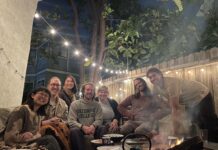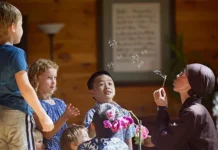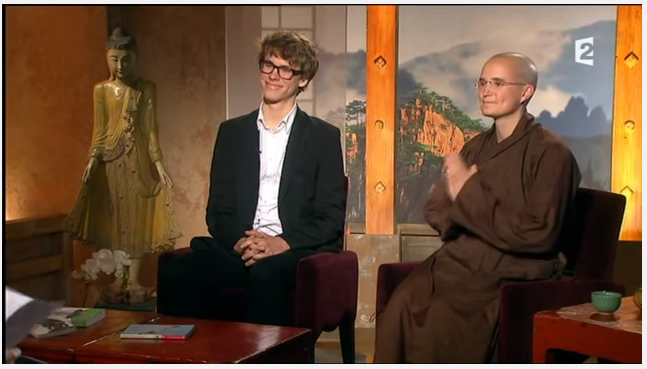On 31st May 2015, Louis Nagot from Wake Up Paris and Sister Su Nghiem were interviewed on French national television.
They shared about the Five Mindfulness Trainings, the Beginning Anew Practice, and the benefits of practicing mindfulness with other young people in a community.
The interview is in French and you can read the English translation below the video.
Click here to watch Part I with Brother Phap Luu and Sister Harmony
Presenter: Good Morning and welcome to Sagesses Bouddhistes. This Sunday we carry on our discovery of the youth Buddhist movement “Wake Up”, which works towards spreading meditation in everyday life. Last week we saw that this movement, created by Vietnamese master Thich Nhat Nanh, has become really famous internationally, and it is growing in France. We will see today, with two new guests, the message and the practice this movement brings about. It’s called the Five Mindfulness Trainings. It’s adapted to the young people and to others, also adapted to hectic stressful life of cities offices and school.
It’s our pleasure today to have Louis Nagot and Sister Su Nghiem. Thanks for being here.
Sister Su Nghiem, you are 32. You were ordained as a nun seven years ago by the Venerable Thich Nhat Hanh in Plum Village. Previously, you were studying philosophy and psychology. You are involved in organising retreats, including for young people, and you have recently taken part in mindfulness retreats in Israel where Israelis and Palestinians have gathered towards reconciliation. Recently, you have done a six-week Wake Up tour in Latin America.
Louis Nagot, you are 24. You are somehow the youngest one in Plum Village. You are studying Literature in Normale Sup college, Paris. You were 18 when you first went to Plum Village for a Wake Up retreat. You are a layman, but you’ve taken the Five Mindfulness Trainings and you’ve contributed to the creation of Wake Up Paris.
To begin, Sister Su Nghiem, what is mindfulness?
Sister Su Nghiem: Mindfulness is an energy; an ability which we all have inside of us, which allows us to recognise what’s happening in the present moment, inside of us and outside of us. It’s the ability to see clearly what’s going on in the emotions, in the thoughts.
This energy allows us to act in a right and fair way with more accuracy and to take decisions with more peace and calmness.
Presenter: So the Wake Up movement wants to spread mindfulness among the young people.
Louis Nagot: Indeed, through weekly meetings in Paris, we look forward to offering to all an opportunity to meditate, to focus on mindfulness through the practise of sitting meditation or practices special to Plum Village like walking meditation. We practise walking meditation in Paris. We walk somehow at 100% totally in the act of walking. We also practise sharing, namely in discussion circles and through an exchange of experiences.
Presenter: So, to realise mindfulness, there are these five basic trainings. Could we list them?
Su Nghiem: Do you want to list them?
Louis Nagot: So the first training is: respect for life, the second: true happiness, the third: true love, the fourth: loving speech and deep listening, and the fifth: mindful consumption and transformation.
Presenter: What about the first one, can you tell us more?
Sister Su Nghiem: This training brings us to become aware of life dimension on Earth — animal, plants, all the ecological dimensions — becoming aware that we are life and life is around us. We are invited to generate compassion though understanding the sacredness and the quality of life. We also train towards inside life. That’s why we are invited to avoid killing with thoughts. We focus on inside vitality.
Presenter: What about the second training, true happiness?
Louis Nagot: True happiness consists of refusing theft, oppression, exploitation, social injustice. It’s a kind of ethos for concrete life. It is to recognise that happiness depends more on the way you are, your state of mind and the way you look at the world rather than on external circumstances like wealth, celebrity, sensual pleasures. Recognising that happiness is easy to achieve, can be achieved here and now, and does not depend on outside conditions.
Presenter: What about the third one, true love, Sister Su Nghiem?
Sister Su Nghiem: This training is about responsibility, especially regarding sexuality. This dimension is very important for the young people. This training invites us to be conscious of our actions and their consequences and to see that we can create lots of suffering when we act without conscience. It also shows us how much suffering is created by sexual abuse in the world, especially for children, and invites us to look at this situation and take action.
The third aspect of this training is to be responsible about our sexual activity and also to develop true love. True love is based on compassion, kindness, equanimity. So at the same time, seeing the suffering and being aware of the suffering and of opening a path of love.
Presenter: The fourth training, one could think it’s similar: “Loving speech.” What’s the difference between this one and true love?
Louis Nagot: Loving speech and deep listening are something that we can practise even with people we don’t like. It’s a way to talk based on kindness, which can be fully received by the other. It may be about difficult things, issues to solve, suffering, but it will be expressed in a way that will allow the other to receive. It’s about creating a communication which goes beyond day to day communication and comes from the heart.
And deep listening, on the other side, for the one who listens is about listening with all our attention on the one who speaks in order to understand them and listen to them with compassion. This exchange allows a deep communication between two people and can solve lots of conflicts, including between people who are not in a romantic relationship.
Presenter: The fifth training, the last one, is transformation and healing. It’s about consuming the suffering caused by mindless, unconscious consumption.
Sister Su Nghiem: Today we consume a lot. We consume food, and we consume with our senses. We “consume” our environment. It’s the collective energy. Everything we receive is a form of food. Coming to this awareness helps us to recognise what feeds us, for our well-being, or for the bad. It’s an aspect of the fifth training. We can choose the elements which will feed us, we can select, and not only in the food area. We can choose what we watch on TV, the music we listen to. It’s not about having prejudices, it’s about knowing what will water the elements of joy and happiness in our spirit.
Presenter: It’s about consuming in the broad meaning of the word. All these trainings are related to today’s life. They must have a real impact on the young people, and in the little ones as well… The Wake Up movement has adapted them to children’s language. Could you give an example?
Sister Su Nghiem: We have a lot of lay people who are teachers and who report experiences of applying mindfulness with the little ones. In the case of a conflict between two kids, what can the teacher do? In one of the stories reported to us, the teacher gets both kids together and listens to them. She takes the time to listen to each of them in the presence of the other one. But only one talks at a time, and the other listens. When one has finished telling what happened, the other one tells his version. Then the teacher summarizes and asks them if they agree with the summary. If they do, some peace comes already, as they can see that no one is right and no one is wrong.
Then the teacher asks both kids to give each other a hug and to sing a song. This teacher uses this method often to solve conflicts. Everyone is listened to and can have a voice.
Presenter: There is a kind of conflict resolution that you have organised with teenagers and their parents which you have called “Beginning Anew” in Plum Village. Could you tell us more?
Sister Su Nghiem: Without going into details, in Plum Village we often practice “beginning anew.” It’s a way for us to take care of relationships daily, to see that our spirits are like gardens, which need regular mending. A flower not watered can die. Our relationships are like flowers. The beginning anew is a practise in several steps, which invites us to take care of relationships by recognising everyone’s positive qualities and expressing these to the other. Being able to see and to say requires courage. That’s already a practice of communication.
And then, expressing regrets. Not judging, but recognising where we are not feeling well and tell it to the other. There are two steps to resolve conflicts; or to care after the relationship when there is a conflict, and to maintain a living relationship. And we can practise Beginning Anew even when there is no conflict. We practise it daily.
Presenter: Louis Nagot, can you tell us about a personal experience which you’ve had with the Wake Up movement? You have contributed to the beginning of Wake Up Paris. What can people feel when they meditate and do things together in mindfulness?
Louis Nagot: The difference between being together or alone is that a group effect is created, and one can feel that things go deeper like for anything done in a group. A community is formed, and it becomes much easier to reach concentration while meditating. The walking meditation is more beautiful when ten people walk together. There is a strong link between participants.
Somehow it is multiplying the benefits of personal practise by the number of people. The group makes it stronger and makes us feel better.
Presenter: Thanks to both of you for having answered our questions, Louis Nagot and sister Su Nghiem.
Thanks for watching. Have a good week, and see you next Sunday.



















How wonderful The Beginning Anew Practice is. We know there is power in numbers and how the world needs numbers in Mindfulness Training and Meditation practices. With the distractions of the world, creating a forum for young people to lead the way is an obvious necessity and gift for the world. I especially support the fifth training about the suffering of consumption. The unsupported heart and soul will consume in all of it’s variants because it feels the pain emptiness. True love is of self first, how can we give something we have not given to ourselves. True love is healing and honoring the rightful place of the heart and soul. In doing so we heal the world and those closest to us. Mindfulness is living in the NOW, observing our responses or reactions, mastering our emotions, personality issues, runaway thoughts, fears. It lifts the mind to purposeful living; honoring the sacred heart. I hope Plum Village seeds and grows all over the world. Kind, loving thanks for this article!